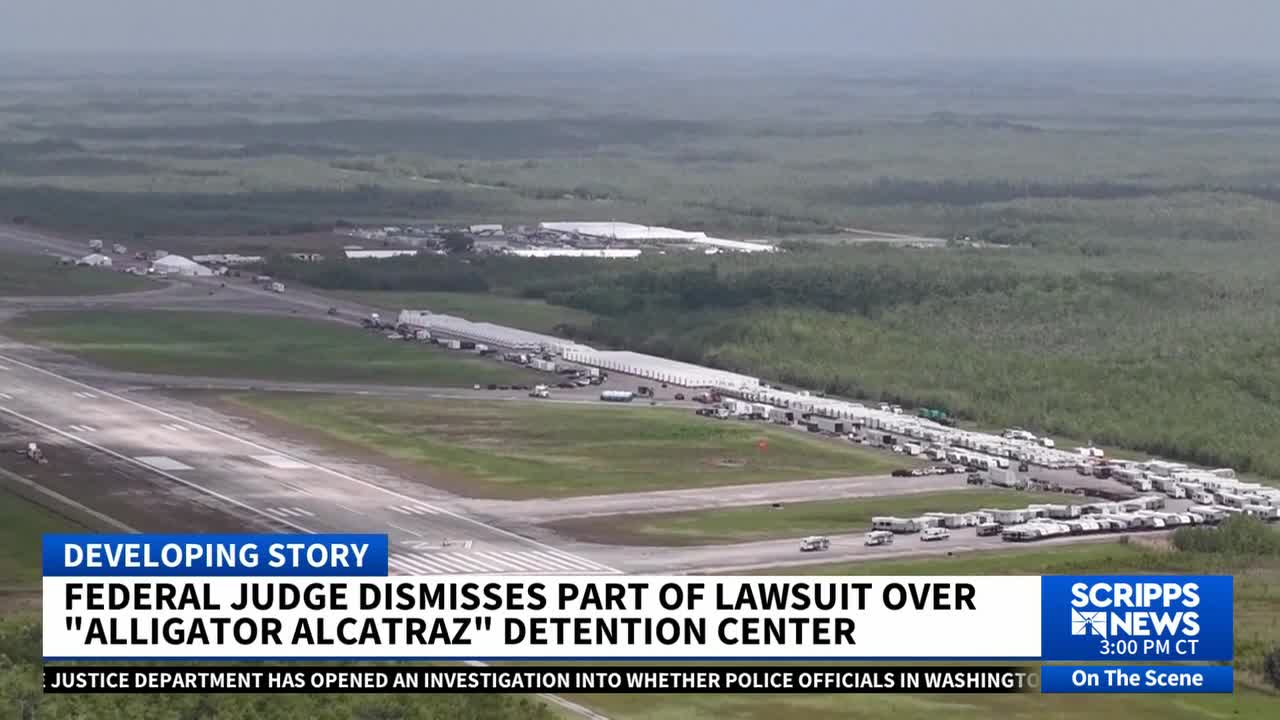A federal judge in Miami dismissed part of a lawsuit that claimed detainees were denied access to the legal system at the immigration detention center in the Florida Everglades known as “Alligator Alcatraz,” and then moved the remaining counts of the case to another court.
Claims that the detainees were denied hearings in immigration court were rendered moot when the Trump administration last weekend designated the Krome North Processing Center near Miami as a site for their cases to be heard, U.S. District Judge Rodolfo Ruiz said in a 47-page ruling Monday night dismissing a Fifth Amendment count.
The judge granted the state defendants a change of venue motion to the Middle District of Florida, where the remaining claims of First Amendment violations will be addressed. Those include allegations of delays in scheduling meetings between detainees and their attorneys and an inability for the detainees to talk privately with their attorneys by phone or videoconference at the facility whose official name is the South Detention Facility.
IN CASE YOU MISSED IT | 'Alligator Alcatraz' 2.0: Second migrant detention center planned in Florida Everglades
ACLU attorney Eunice Cho, the lead attorney for the detainees, said the federal government only reversed course last weekend and allowed the detainees to petition an immigration court because of the lawsuit.
“It should not take a lawsuit to force the government to abide by the law and the Constitution,” Cho said. “We look forward to continuing the fight.”
The judge heard arguments from both sides in a hearing earlier Monday in Miami. Civil rights attorneys were seeking a preliminary injunction to ensure detainees at the facility had access to their lawyers and could get a hearing.
Republican Gov. Ron DeSantis’ administration raced to build the facility on an isolated airstrip surrounded by swampland two months ago in order to aid President Donald Trump’s efforts to deport people in the U.S. illegally. The governor has said the location in the rugged and remote Everglades was meant as a deterrent against escape, much like the island prison in California that Republicans named it after. The detention center has an estimated annual cost of $450 million.
The state and federal government had argued that even though the isolated airstrip where the facility is located is owned by Miami-Dade County, Florida’s southern district was the wrong venue since the detention center is located in neighboring Collier County, which is in the state’s middle district.
Judge Ruiz had hinted during a hearing last week that he had some concerns over which jurisdiction was appropriate. Attorneys for the detainees had argued that Ruiz's court was appropriate since the detainees were under the oversight of federal officials in the Miami regional office. Any transfer to another venue would cause a delay in a court decision.
Ruiz noted the facts in the case changed Saturday when the Trump administration designated the Krome facility as the immigration court with jurisdiction over all detainees at the detention center.
IN RELATED NEWS | Trump says he'll reopen Alcatraz prison for 'America’s most ruthless and violent Offenders'
Ruiz wrote that the case has “a tortured procedural history” since it was filed July 16, weeks after the first group of detainees arrived at the facility.
“Nearly every aspect of the Plaintiffs’ civil action — their causes of action, their facts in support, their theories of venue, their arguments on the merits and their requests for relief — have changed with each filing,” the judge wrote.
The state and federal government defendants made an identical argument last week about jurisdiction for a second lawsuit in which environmental groups and the Miccosukee Tribe sued to stop further construction and operations at the Everglades detention center until it’s in compliance with federal environmental laws.
U.S. District Judge Kathleen Williams in Miami on Aug. 7 ordered a 14-day halt on additional construction at the site while witnesses testified at a hearing that wrapped up last week. She has said she plans to issue a ruling before the order expires later this week. She had yet to rule on the venue question.
Detainees at the facility have said worms turn up in the food, toilets don’t flush, flooding floors with fecal waste, and mosquitoes and other insects are everywhere.
Civil rights attorneys also said officers were going cell to cell to pressure detainees into signing voluntary removal orders before they’re allowed to consult their attorneys, and some detainees had been deported even though they didn’t have final removal orders. Along with the spread of a respiratory infection and rainwater flooding in tents, the circumstances had fueled a feeling of desperation among detainees, the attorneys wrote in a court filing.




